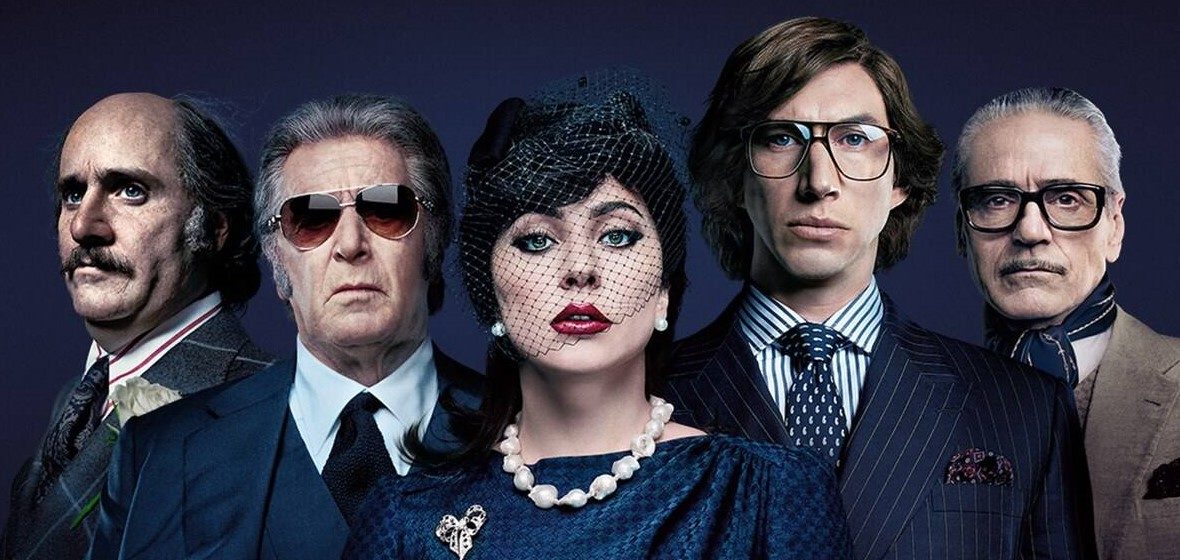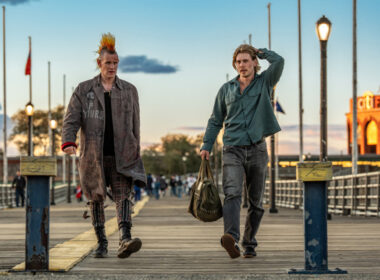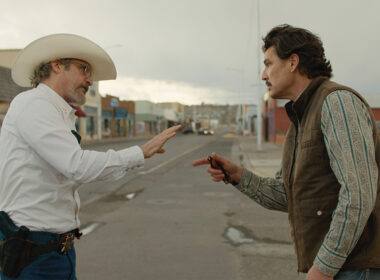Rating: ***
Credit where it’s due: House of Gucci knows precisely the kind of film it wants to be. An over-the-top, melodramatic, sometimes lurid, sometimes thrilling account of the family’s fall that built an international fashion empire. Like always, there’s a woman at the centre, Patrizia Reggiani (Lady Gaga), a commoner with big dreams, daughter of a business owner who may or may not have connections to organised crime – a passing comment made by another character as a classicist jib, as if common folk can’t own businesses without help. Patrizia, unfazed, wiggles her way into the family via her marriage to Maurizio Gucci, the awkward bookworm who lost some affinity to his family. The film starts with Maurizio’s iconic glasses, Boucheron watch on his wrist, and riding his bike to work. It’s the morning Maurizio will be shot by a contracted killer hired by his wife, Patrizia. If you don’t remember that day in 1995, now you know (the film assumes you do).
It’s never apparent Patrizia’s goal with the family. Maurizio’s father, Rodolfo (Jeremy Irons), disowns his son for marrying a vulgar woman; his uncle Aldo (Al Pacino) see Maurizio as the future of the family as his son Paolo (Jared Leto) doesn’t have the intelligence or grit to run the empire. Maurizio and Patrizia find an outdated brand living off the laurels of the past. Aldo is interested in catering to a niche market that sees the name as more important than the work. Paolo lost in his lack of talent. Rodolfo, in his empty castle surrounded by old art and his trusted advisor Domenico (Jack Huston). This comprises the section of the film that doesn’t ultimately work. Too focused on the influence of Patrizia to see the broader scale of the downfall. Too stale to have the exciting luridness of the start and lacking the drive and plot of the third section, it’s the moment in the script you realise the writing team of Becky Johnston and Roberto Bentivegna could not commit to one idea.
It’s Ridley Scott and the actors that make it worth it. Scott releases his second film this year, a feat for an octogenarian, let alone in the middle of a pandemic, and again he shows how much he can do with his eyes closed. The style is effortless, mainly because he embraces the aesthetic elements of the culture he’s shooting. Gaga’s introduction is a fun slow-motion tracking shot of Patrizia walking in front of a group of construction workers, playfully pulling her dress down as she balances in her heels in front of a crowd of wolf-whistling men. Later Scott shots drama with the same earnestness of an Italian soap, that bubbling repressed Catholic sentiment just crying to come out. To any white-angle sensibility, it may be a bit too much, but what do they know anyway? Scott understands that when in Rome…
If anything, he fails for not going too far. Firstly he doesn’t quite understand the dynamic of the family. It’s understandable; you need personal experience to get it. The first twenty minutes in The Godfather didn’t come from studying visual storytelling but from Coppola’s own heart. At points, it relies too much on Patrizia as the scapegoat, which is unfair to both her and a family believed to be so fragile that an underwritten gold digger could tear it apart?
On the other hand, it doesn’t build from the broader anti-capitalist message it almost touches. It reminds of James Mangold’s underrated Ford vs. Ferrari that also featured a historical Italian family business. The most vital part of that film came from Ferrari’s admiration for the art of driving against the need for profit. Gucci tries to say the same but is not earnest enough to take it over the finish line. The two heartbreaking moments come when Rodolfo and Aldo reminisce about a piece of design that means something special for them. The added factor is that Aldo tells this story before the billionaire who is trying to convince him to sell his business shares. I thought it was curious this idea wasn’t explored, but of course, the end titles fawn over the current owners who saved the company – so I guess it’s worth it to sell our sale.
The actors are all terrific. Gaga owns her role with more blood and sweat than she did in A Star is Born. There’s a Bette Davis meets Monica Vitti by way of Gina Lollobrigida that fits her so well. It’s precisely the kind of energy the film needs: her entire range of emotions in the three minutes after the murder alone should put her as a contender come award season. Driver is the perfect counterpoint to her excess, slowly blossoming from the naive ideologist of the beginning into the ruthless playboy of the end. Pacino is enormous. Do you miss the over-the-top, Scent of a Woman, “OOO-AAAAAH” Pacino? He’s back. There’s a beautiful moment when he cries before hugging his son that made me realise we’ll probably never again see an actor that can confidently over dramatically explode as he can.
Leto is the weakest link of all. His Paolo looks the part, and some of his mannerisms are correct. Still, while the rest of the cast understands the nuances of the Italian accent, Leto’s “it’s-a-me” pantomime is not only distracting, but it would’ve been offensive if it wasn’t so bad.
House of Gucci is a solid thriller whose only crime is it does not go far enough. It’s like it was afraid to embellish its story too much when this is precisely the world where it could thrive. For all the great ideas in it, a lot is lost in the hesitation to go further and beyond. Patrizia is the epitome of this: a fascinating character whose own mark is more complex than what the script shows. In real life, it is never just the dame’s fault.




